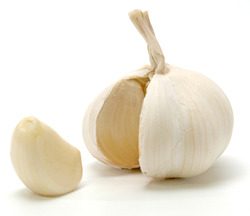Garlic neutralises resistant bacteria
A researcher at the University of Copenhagen has written his PhD thesis on the positive properties of garlic, with particular emphasis on its effect against bacteria.
PhD student Tim Holm Jakobsen said garlic contains a substance called ajoene: “A potent chemical compound … [which] specifically prevents the bacteria from secreting the toxin rhamnolipid, which destroys white blood cells in the body. White blood cells are indispensable because they play a crucial role in the immune defence system; not only warding off infection, but also killing bacteria.”

When bacteria clump together in what is known as biofilm - where they surround themselves with a tough film of organic materials - they become resistant to antibiotics. Jakobsen has demonstrated the effect of ajoene on biofilm cultivated in the laboratory and in trials with mice.
“When we add antibiotics to biofilm they have very little effect, and ajoene alone barely makes any difference,” he said. “It is only when the two are combined that something significant happens.”
The ajoene blocks the bacteria’s communication system - known as quorum sensing - which is used for various purposes including creating infection. When combined with antibiotics, the treatment killed more than 90% of the normally virulent biofilm.
However, noted Jakobsen, “Garlic contains so little ajoene that you would need to eat around 50 a day to achieve the desired effect.” For this reason, researchers are working to augment the natural material through chemical synthesis.
Jakobsen hopes the pharmaceutical industry will also join in on production, claiming, “Nature is a great starting point for developing medicines - two-thirds of all new pharmaceuticals are based on natural substances.”
Blood test could be used to diagnose Parkinson's earlier
Researchers have developed a new method that requires only a blood draw, offering a non-invasive...
Cord blood test could predict a baby's risk of type 2 diabetes
By analysing the DNA in cord blood from babies born to mothers with gestational diabetes,...
DNA analysis device built with a basic 3D printer
The Do-It-Yourself Nucleic Acid Fluorometer, or DIYNAFLUOR, is a portable device that measures...



